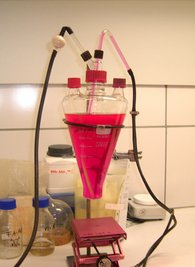GeoBioLab – Helmholtz Laboratory for integrated geological and biological research
At the GFZ German Research Center for Geosciences the Helmholtz Laboratory for Integrated Geological and Biological Research (GeoBioLab) is an interdisciplinary platform bringing together scientists from various disciplines, such as microbiology/molecular biology, biogeochemistry, pedology/sedimentology, geology, mineralogy, and physics to answer fundamental questions on surface/deep biosphere interactions, especially within the critical zone, by means of cutting-edge research methods. In order to perform basic research on (micro)biological, (bio)geochemical and geological processes and their interactions in deep sedimentary deposits the laboratory is fully equipped for both research in classical microbiology investigations (e.g. isolation and characterization of bacteria and archaea, taxonomy and physiology) as well as cultivation independent characterization of microbial communities (e.g. DNA/RNA based studies, qPCR, Stable Isotop Probing, Next Generation Sequencing, bioinformatics). Major aspects of such investigations consist of quantifying slow biological processes, particularly microbial transformation pathways and turnover rates of organic compounds in geological habitats, including the modelling of geomicrobiological processes and microbial networks.
Within the framework of the Helmholtz Research Programme “Geosystem – The Changing Earth” a further development of the GeoBioLab is planned which comprises new specific laboratories and appropriate equipment such as simulation and isotope laboratories to perform microbial process studies under controlled environmental conditions e.g. ultrasensitive rate measurements of slow metabolic processes by means of radioactively marked substrates.
Facilities:
- autoclaves (Systec)
- clean benches (Thermo Fisher)
- glove box (Whitley)
- PCR work stations (AirClean)
- incubators (Binder, Satorius, Infors)
- gas chromatographs (Agilent)
- ion chromatographs (Sykam)
- centrifugation systems (Sigma, Thermoscientific)
- microscopes (Leica)
- fastprep (MP Biomedicals)
- (q)PCRs (Biorad)
- bioanalyzer (Agilent)
- nanophotometer (implen)
- denaturing gradient gel electrophoresis (Biorad)
- gel documentation system (Intas)
- electrophoresis systems (Biorad)
- flow cytometer (Beckton Dickinson)
Experimental applications:
- separation of extra- and intracellular DNA (e/iDNA)
- fluorescence in situ hybridization (FISH, CARD-FISH)
- anaerobic culture techniques (Hungate, Widdel)
- permafrost microcosm (simulation of freezing-thawing cycles, global warming)
- physiological stress experiments (temperature, salinity, radiation, desiccation)
- activity measurements (radio tracer experiments, e.g. hydrogenase tritium assay)
- specific incubation systems (e.g. HipP – incubation under high hydrostatic pressure and high gas saturation)





